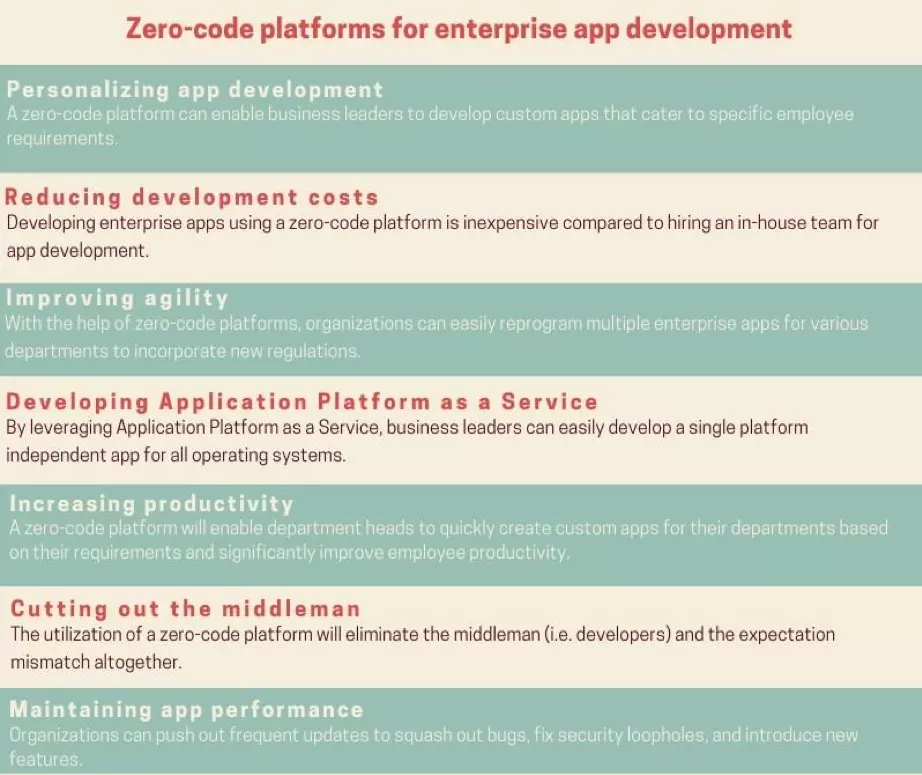Businesses are leveraging zero-code platforms to build automated and fully functional apps.
Similarly, organizations can deploy a zero-code platform to accelerate the development of their enterprise apps.
Enterprise apps are a necessity for every business in the digital age. Using enterprise apps, employees and business leaders can work remotely and integrate critical data with their business systems. For adopting such apps, organizations generally purchase or subscribe to off-the-shelf, one-size-fits-all apps for their employees. Off-the-shelf apps can be expensive and often fail to deliver the required results. Additionally, such apps provide little to no customization, affecting overall employee experience. Hence, organizations are always searching for better alternatives to develop high-end enterprise apps. One such alternative that every business leader must look into is zero-code platform. A zero-code platform is a feasible app development solution that delivers advanced and user-friendly enterprise applications. A zero-code platform enables business leaders and employees to develop their own enterprise apps without any technical knowledge. Such platforms contain intuitive drop-down menus and app module interface for simplifying app development. With a zero-code platform, organizations can easily create numerous customizable enterprise applications for their employees. Due to simplified app development, zero-code platforms have the potential to decentralize enterprise app development for several organizations.
How Zero-Code Platform Can Improve Enterprise App Development
A zero-code platform can benefit business organizations in the following ways:

1. Personalizing App Development
A zero-code platform can enable business leaders and employees to develop custom apps that cater to specific employee requirements. For instance, employees who suffer from color blindness may have difficulties using certain apps. For such employees, business leaders can design apps with specific color schemes for their condition or add an option to select different themes. Generic enterprise apps do not offer such employee-specific personalization. Hence, developing apps with a zero-code platform can deliver a better employee experience compared to off-the-shelf apps.
Business leaders can also have a consistent look for all of their enterprise apps with a zero-code platform. For this purpose, business leaders can select specific UI elements such as color schemes, icons, app layout, and navigation. Also, organizations can add extra features to their apps that are not available on other enterprise apps for enhanced functionality.
2. Reducing Development Costs
Organizations usually hire an in-house team of developers or enterprise architects for digital transformation and enterprise app development. Hiring an in-house team is an additional expense for every business. For small and medium businesses, managing the expenses for an in-house team along with other expenses can be extremely stressful. Alternatively, some organizations delegate app development tasks to their IT teams. Although IT professionals can develop enterprise apps, managing core tasks along with app development can be complicated. Organizations may also need to train their IT professionals for building enterprise apps. Additionally, various hidden costs and technicalities are involved in app development. Hence, business leaders have to take these extra expenses into account. Developing apps using a zero-code platform is an inexpensive solution. Several zero-code platforms offer a ‘pay for what you use’ model for app development. Business leaders don’t have to pay licensing fees or buy expensive app bundles, unlike some off-the-shelf enterprise tools. The costs involved in developing enterprise apps for zero-code platforms are completely transparent to avoid any possibility of hidden costs. Hence, using a zero-code platform is always affordable for businesses.
3. Improving Agility
Every organization needs multiple enterprise apps for various business workflows. These apps must be altered according to the changes in regulations or changes in the industry. For example, a manufacturing organization can use a checklist management app for regulatory compliance. In case any regulations are changed or new regulations are introduced, the app will need to be altered accordingly. Likewise, several enterprise apps may need new elements in their enterprise app or changes in app behavior. To integrate such changes, organizations have to keep track of upcoming industry changes and new regulations. Then, organizations can edit app modules of their enterprise apps to incorporate required changes and rebuild the app with a zero-code platform. With this approach, organizations can adapt to upcoming changes without affecting their business operations.
4. Increasing Productivity
Multiple departments in an organization need to request their IT team for enterprise app development. IT professionals have to develop several apps for different departments along with other tasks such as cybersecurity and software updates. As a result, high demand of apps creates a bottleneck that IT professionals find impossible to keep up with. This bottleneck creates an app development backlog for the IT team. Also, app development is an extensive process with multiple stages such as coding, compiling, testing, public beta testing, reviewing feedback, and eliminating bugs before releasing the final app. Considering the sheer volume of app demands, the entire process can be time-consuming for IT staff. Hence, every department has to wait for IT professionals to develop enterprise apps affecting the productivity of the entire department. A zero-code platform will enable department heads to create custom apps for their department based on their requirements. With this approach, every department can rapidly develop their own enterprise app. By creating apps with a zero-code platform, departments can improve their productivity and reduce the overwhelming volume of app demands for IT staff.
5. Cutting Out the Middleman
Several organizations outsource enterprise app development to app development firms. A major concern in outsourcing enterprise app development is expectation mismatch. The developers create an enterprise app that is different from what the business owner wanted. For instance, an organization outsourced a location-based work check-in and check-out app to an app development firm. But, the developers created an app that tracks location even after the employees have checked-out. Employees may be concerned while using this app as it invades their privacy. Likewise, expectation mismatch is a common occurrence in enterprise app development. After identifying such flaws, developers have to reprogram and test apps again, resulting in a slow app development process.
The utilization of a zero-code platform will eliminate the middleman and the expectation mismatch altogether. With a zero-code platform, business leaders and department heads can create apps that cater to their requirements and test these apps for evaluation. In case an app doesn’t align with the employees’ and department head’s requirements, reprogramming apps using a zero-code platform is remarkably simple. Also, testing and redeveloping these apps will be more efficient as reprogramming enterprise apps with a zero-code platform is less time-consuming.
6. Developing Application Platform as a Service
Developers have to program multiple apps for different operating systems such as Android and iOS. Building multiple apps for different platforms and operating systems can be a tedious task. In this scenario, a zero-code platform can be used to develop an Application Platform as a Service (APaaS). APaaS can enable end-users to access enterprise apps via their browsers. By leveraging APaaS, business leaders can easily develop a single platform-independent app for all operating systems. These apps can easily integrate with complex business systems using cloud servers.
7. Maintaining app performance
Another major aspect of enterprise app development is maintenance. Every organization needs frequent security and performance checks to identify bugs and glitches. For this purpose, business leaders and departments can ask for feedback about app performance and apparent glitches from their employees. After reviewing the feedback, business leaders can rebuild the enterprise app with a zero-code platform to squash out bugs. Also, organizations can take suggestions from employees to understand how they can make their apps better. Then, organizations can evaluate these suggestions and conveniently introduce new features with a zero-code platform. Therefore, organizations can easily handle maintenance tasks and improve app performance with a zero-code platform.
Along with these benefits, a zero-code platform offers built-in security and data integration capabilities for data-driven businesses. Hence, organizations can build and rebuild apps on the fly and accelerate digital transformation with a zero-code platform. With such great potential, zero-code platforms can democratize enterprise app development. Hence, business leaders must consider zero-code platforms for enterprise app development.



Leave your comments
Post comment as a guest